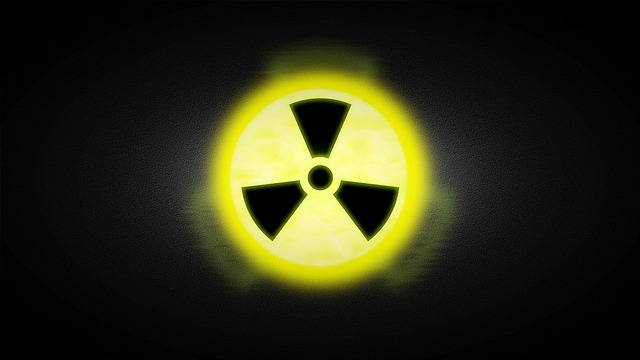Advancements in radioactive contrast agents (RCAs) for nuclear medicine enhance image quality, improve detection, and reduce patient radiation exposure. Researchers develop sophisticated agents with extended half-lives and precise molecular targeting. These innovations promise to revolutionize diagnostics, enabling personalized treatments via AI integration for improved patient outcomes.
The field of nuclear medicine is poised for a transformative leap with advancements in contrast agents. This article explores future innovations in radioactive molecules designed to enhance imaging accuracy, improve patient safety through reduced radiation exposure, and enable targeted therapy tailored to specific tissues. By integrating artificial intelligence, these developments promise precise diagnostics and personalized treatment plans, revolutionizing healthcare’s approach to detecting and treating disease.
Enhancing Image Quality: Advancements in Radioactive Molecules
Advancements in radioactive molecules play a pivotal role in enhancing image quality in nuclear medicine. Researchers are developing more sophisticated radioactive contrast agents that can provide clearer, more detailed images of internal bodily structures. These innovative compounds are being engineered to target specific tissues or organs, enabling better detection and diagnosis of various medical conditions.
The field is witnessing significant progress in designing radioisotopes with improved half-lives, allowing for extended imaging periods and reduced patient exposure to radiation. Additionally, the incorporation of advanced molecular targeting strategies ensures that the contrast agents accumulate specifically in diseased areas, improving diagnostic accuracy. These advancements have the potential to revolutionize precision diagnostics, enabling healthcare professionals to make more informed decisions and ultimately enhancing patient outcomes.
Safeguarding Patients: Reducing Radiation Dose
In the pursuit of precision diagnostics, one of the primary focuses in nuclear medicine is ensuring patient safety and minimizing radiation exposure. This becomes increasingly important as we develop and utilize more advanced radioactive contrast agents (RCAs). The traditional method of using high doses of radiation for imaging can lead to potential health risks over time. Therefore, researchers are dedicated to creating RCAs that enable clearer visuals with significantly lower radiation dosages.
Innovations in RCA design aim to enhance signal detection while reducing the amount of radiation absorbed by patients. This is achieved through various strategies, such as improving the half-life of radioisotopes and refining the chemical composition of contrast agents, allowing for more efficient and targeted accumulation in specific body areas of interest. By implementing these advancements, medical professionals can offer improved diagnostic capabilities without compromising patient safety.
Targeted Therapy: Personalized Contrast Agents for Specific Tissues
In the realm of targeted therapy, the future of nuclear medicine contrast agents lies in personalized treatments tailored to specific tissues. Researchers are developing advanced radioactive contrast agents that can precisely deliver diagnostic and therapeutic radionucleides directly to target cells or organs. This approach promises significant improvements in precision diagnostics and personalized medicine. By employing molecular imaging techniques, these contrast agents enable healthcare professionals to visualize and monitor disease progression in real-time, allowing for more effective treatment planning and outcomes.
The integration of artificial intelligence (AI) and machine learning algorithms further enhances the potential of targeted therapy contrast agents. AI-driven systems can analyze vast amounts of patient data, including medical history and imaging results, to predict optimal agent formulations and administration protocols. This level of personalization ensures that each patient receives a unique treatment plan, maximizing the efficacy of radioactive contrast for nuclear medicine while minimizing side effects. As research progresses, we can expect these innovations to revolutionize diagnostic procedures and lead to more successful outcomes in various medical specialties.
Future Perspectives: Integrating AI for Precise Diagnostics
The future of nuclear medicine contrast agents lies in their seamless integration with artificial intelligence (AI) technologies, paving the way for unprecedented precision diagnostics. AI algorithms have the potential to analyze complex data sets generated by advanced radioactive contrast agents, enabling more accurate and detailed imaging. By leveraging machine learning techniques, these systems can identify subtle changes in tissue characteristics, enhancing the detection of various medical conditions at their earliest stages.
This innovative approach promises to revolutionize the field by improving diagnostic speed and accuracy. With AI-driven analysis, healthcare professionals can make more informed decisions, leading to personalized treatment plans. As research progresses, we can expect to see the development of intelligent contrast agents that actively interact with AI systems, further transforming nuclear medicine into a highly precise and effective diagnostic tool for countless medical applications.
The future of nuclear medicine diagnostics looks bright with continuous advancements in radioactive contrast agents. By enhancing image quality, reducing radiation doses, and developing personalized, targeted agents, healthcare professionals can achieve more precise diagnoses. Integrating artificial intelligence promises to revolutionize these processes further, leading to faster, more accurate results for improved patient outcomes. These innovations in nuclear medicine contrast agents are set to transform the field, ensuring better care and outcomes for patients worldwide.
